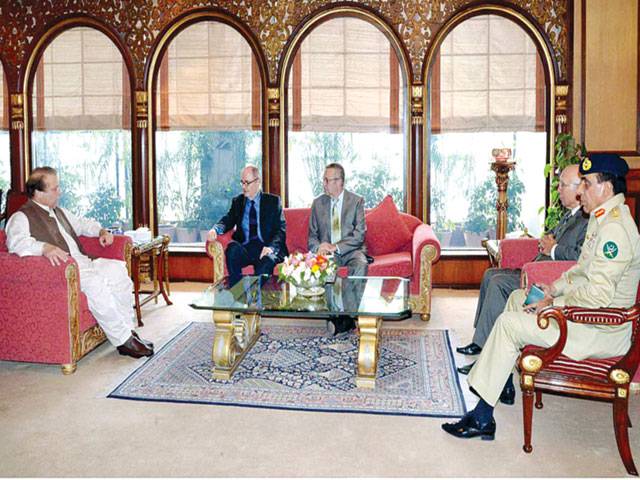ISLAMABAD - The United States Tuesday acknowledged Pakistan’s “supportive role” in the peace talks with the Taliban and said it wants the process to succeed.
US Special Representative for Afghanistan and Pakistan James Dobbins who is on his second visit to Pakistan, since he got the new assignment in May, said the country’s leadership has extended support to the Afghan peace process.
Dobbins – who earlier in the day held in-depth talks with Prime Minister Nawaz Sharif, Foreign Secretary Jalil A Jilani and Chief of the Army Staff General Ashfaq Parvez Kayani – to reporters here at the US embassy that Pakistani leaders evinced interest in the progress made so far.
Prime Minister Nawaz Sharif told the US envoy during their meeting that Pakistan is striving for reconciliatory talks on Afghanistan as it has high stakes in return of peace and stability to the neighbouring country, according to PM Office.
The participants of the meeting discussed the situation in Afghanistan‚ peace dialogue with Taliban‚ upcoming visit of US Secretary of State John Kerry to Pakistan and other issues. The two sides reportedly also exchanged views on possibilities of halting drone strikes and bilateral cooperation.
Sources said the prime minister termed US drone attacks as unacceptable and said that they are an attack on ‘our sovereignty’. He stressed that the US should immediately stop highly unpopular and counterproductive drone strikes and take concrete steps for checking militant infiltration from Afghanistan.
Dobbins in his press talk said that in his meetings with Pakistani leaders, Islamabad expressed its commitment to continue its support and to use its influence in the Afghan peace process. He said the United States appreciated the support as both the countries desire peace in the region.
To a question Dobbins said “I don’t think anybody controls the Taliban, but I think Pakistan probably has the greatest influence.” Elaborating he said he believes Pakistan does not have a controlling influence on the Taliban, but enjoys more influence than others.
Referring to the post 2014 situation, the US Special Representative said his country would continue to work with Pakistan and count on it to contribute to the civility in Afghanistan, besides continuing to have a significant dialogue.
He allayed the apprehensions that Pakistan will be left alone following the withdrawal of the US and NATO forces and said “history doesn’t necessarily repeat itself, and I think we have learnt some lessons too.” He hoped the US relations with Pakistan will expand further and mentioned the broad dialogue the two countries already have. “We have achieved a fairly stable and positive level and I anticipate we will expand that cooperation.”
Ambassador Dobbins arrived in Islamabad after meeting President Hamid Karzai in Kabul, following the much-awaited talks between the Taliban and the Afghan government failed to kick off in Doha. The dispute arose after the Taliban put up a plaque of “Islamic Emirate of Afghanistan” and the white flag at their Doha office, which did not go well; both with the US and the Afghan government, as they saw it as a Taliban government in exile.
Dobbins said the US was the first to react and informed Qatar government that it was inconsistent with the assurances given to it before the initiation of talks. He termed it as a “misunderstanding” and an attempt by the Taliban to “stage a propaganda coup in an exaggerated manner.”
Dobbins said the US asked for the signs to be removed. “This has been done. We are waiting to see if they [Taliban] are willing to engage.” He said his meeting with Karzai was positive and the president was willing to move forward on peace talks. Without giving any time frame said he was hopeful that talks between the Government of Afghanistan and the Taliban will start in the next couple of weeks.
In their meeting PM Nawaz assured Dobbins of Pakistan’s full commitment to the peace process and highlighted various steps taken in the regard. It was decided that ISAF and Pakistan military would enhance cooperation on border issues and they agreed on timely intelligence sharing and increased cooperation.
Soon after Nawaz- Dobbins meeting, PM Nawaz rang up President Hamid Karazi and took him into confidence on negotiations with the US envoy and offered Pakistan’s all out support to Kabul for peace. Government sources said Nawaz and Karazi are on same page on the issue they both agreed to strive jointly for peace. The contact was made before Karzai’s press conference in Kabul following a Taliban attack on Presidential Palace and a CIA base.
PM Nawaz condemned the attacks and expressed solidarity with Afghanistan. It was agreed between the two leaders that the two states would enhance intelligence sharing and coordination between their forces, especially at the borders, to frustrate the designs of miscreants bent on disrupting peace on both sides of the border.
Friday, April 19, 2024
US acknowledges Pak role in Afghan talks

9:26 AM | April 19, 2024
8:09 AM | April 19, 2024
PTI founder’s interim bail extended in three cases
12:00 PM | April 19, 2024
US encourages Pakistan to prioritise and expand economic reforms
11:42 AM | April 19, 2024
Hafiz Naeem takes oath as JI chief, announces anti-government movement
11:39 AM | April 19, 2024
Faizabad commission report leaked, it should be made public now, suggests Abbasi
11:11 AM | April 19, 2024
A Tense Neighbourhood
April 19, 2024
Dubai Underwater
April 19, 2024
X Debate Continues
April 19, 2024
Hepatitis Challenge
April 18, 2024
IMF Predictions
April 18, 2024
Kite tragedy
April 19, 2024
Discipline dilemma
April 19, 2024
Urgent plea
April 19, 2024
Justice denied
April 18, 2024
AI dilemmas unveiled
April 18, 2024
ePaper - Nawaiwaqt
Advertisement
Nawaiwaqt Group | Copyright © 2024





